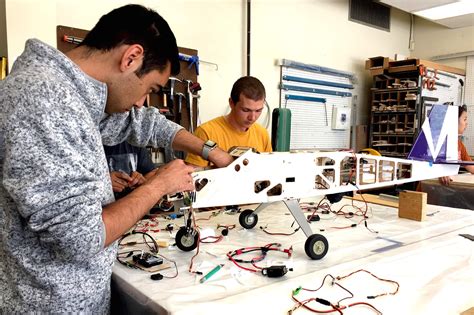Introduction

For high school students with a passion for the skies, aerospace engineering summer internships offer a transformative opportunity to delve into the captivating world of aviation, space exploration, and aeronautical design. These immersive experiences ignite creativity, cultivate problem-solving skills, and provide invaluable insights into the field of aerospace engineering.
Benefits of Aerospace Engineering Internships
Embarking on an aerospace engineering summer internship empowers high school students with a multitude of benefits, including:
-
Hands-on Experience: Internships provide students with the opportunity to apply their classroom knowledge in real-world settings, engaging in hands-on projects and experiments.
-
Industry Insight: Internships offer unprecedented exposure to the aerospace industry, fostering connections with industry professionals and showcasing the latest technologies and innovations.
-
Skill Development: Internships facilitate the acquisition of technical skills in areas such as design, analysis, and testing, while also enhancing communication, teamwork, and problem-solving abilities.
-
Career Exploration: Internships serve as an invaluable platform for exploring career paths in aerospace engineering, enabling students to identify their interests and aspirations within the field.
-
Enhanced College Applications: Participation in aerospace engineering internships significantly strengthens college applications, demonstrating a student’s commitment to the field, practical experience, and professional development.
Finding Aerospace Engineering Internships
Identifying suitable aerospace engineering internships for high school students requires a proactive approach. Consider the following resources:
-
School Career Counselors: Seek guidance from school career counselors who may have established relationships with aerospace companies or organizations offering internships.
-
Local Aerospace Companies: Contact local aerospace companies directly to inquire about internship opportunities. Smaller companies often offer internships not widely advertised online.
-
Online Job Boards: Utilize online job boards such as LinkedIn, Glassdoor, and Indeed to search for internships specifically tailored to high school students.
Tips for a Successful Internship Application
To maximize the chances of securing an aerospace engineering internship, follow these tips:
-
Tailor Your Resume: Highlight skills and experiences relevant to aerospace engineering, including technical projects, extracurricular activities, and any related coursework.
-
Craft a Compelling Cover Letter: Articulate your passion for aerospace engineering, demonstrate your understanding of the field, and explain why you are a suitable candidate for the internship.
-
Network and Reach Out: Attend industry events, connect with professionals on LinkedIn, and don’t hesitate to reach out to companies expressing your interest in internships.
-
Seek Recommendations: Ask teachers, mentors, or previous employers for letters of recommendation that attest to your technical abilities and work ethic.
Table 1: Leading Aerospace Companies Offering Internships for High School Students
| Company | Industry Focus | Internship Opportunities |
|---|---|---|
| Boeing | Commercial aircraft, defense systems | Summer internships in design, manufacturing, and engineering |
| Lockheed Martin | Defense, aerospace, and technology | Internships in various technical disciplines and engineering fields |
| SpaceX | Reusable rockets, space exploration | Internships in propulsion, guidance, and controls |
| NASA | Space exploration, aeronautical research | Internships in science, engineering, and technology |
| Raytheon Technologies | Aerospace, defense, and cybersecurity | Internships in electronics, materials, and systems engineering |
Table 2: Types of Aerospace Engineering Internships for High School Students
| Internship Type | Description |
|---|---|
| Design Internships | Focus on designing and developing aircraft, spacecraft, or aerospace components |
| Manufacturing Internships | Involve working in manufacturing facilities to learn about production processes and quality control |
| Research Internships | Engage students in research projects related to aerospace technologies and innovations |
| Laboratory Internships | Provide hands-on experience in laboratory settings, conducting experiments and analyzing data |
| Technical Assistance Internships | Offer students the opportunity to assist engineers with day-to-day tasks and projects |
Table 3: Qualifications for Aerospace Engineering Internships
| Qualification | Description |
|---|---|
| Strong Academic Performance | Maintain a high GPA, particularly in math, science, and physics |
| Technical Skills | Possess a basic understanding of aerospace engineering principles, including aerodynamics, propulsion, and materials science |
| Extracurricular Activities | Participate in STEM clubs, robotics teams, or other activities that demonstrate a passion for aerospace engineering |
| Problem-Solving Abilities | Show an aptitude for solving complex problems and thinking critically |
| Communication Skills | Demonstrate strong written and verbal communication skills |
Table 4: Benefits of Aerospace Engineering Internships for Students
| Benefit | Description |
|---|---|
| Practical Experience | Gain hands-on experience in the field of aerospace engineering |
| Industry Insight | Develop a deeper understanding of the industry and its latest trends |
| Skill Development | Enhance technical skills, problem-solving abilities, and communication skills |
| Career Exploration | Explore different career paths in aerospace engineering |
| College Preparation | Strengthen college applications and demonstrate a commitment to the field |
Conclusion
Aerospace engineering summer internships for high school students are invaluable opportunities that ignite a passion for aviation, space exploration, and aeronautical design. By providing hands-on experience, industry insight, skill development, and career exploration, these internships empower students to launch their careers in aerospace engineering and make a meaningful contribution to the field.
